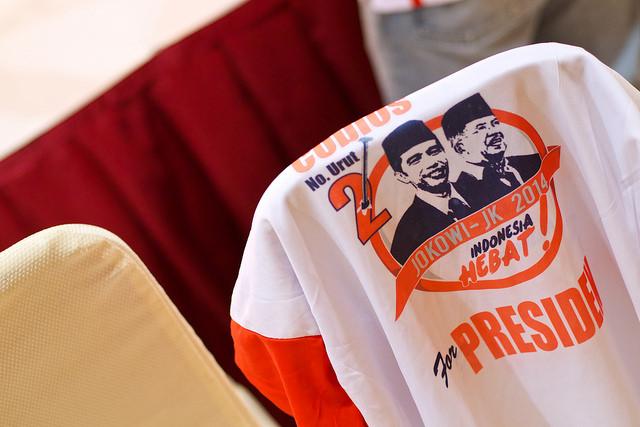
This week’s big story was, of course, Indonesia’s presidential election on 9 July. For an excellent wrap of the day’s events as seen via social media, check out this AIYA post. So far from the quick count, it looks like Jakarta governor Joko Widodo has emerged the winner, but former Kopassus commander Prabowo Subianto has refused to concede defeat. The confusion has resulted partly from some polls that show the former general ahead, despite the majority of well-respected polling outlets giving the nod to Jokowi by a margin of 4–5%. The Electoral Commission (KPU) will hand down its ruling on 22 July, but the matter could still go to the constitutional courts.
If Jokowi secures the presidency, what can we expect from his foreign policy? Here’s a useful overview by Colin Brown in which he suggests that Jokowi’s ‘strong position on maritime matters generally in the region would sound warning bells [with China]’. On ABC’s special program The World: Indonesia Votes (watch it in full here or by topic here), I noted that Australia would be important to Indonesia, but ASEAN would always come first.
Looking for some analysis on Japanese PM Abe’s visit to Australia this week? Over at East Asia Forum, Jim Rolfe explains that the warmth in the Japan–Australia relationship isn’t just about the regional security situation, rather ‘it is hard not to think that the energy behind recent defence and economic closeness derives more from political considerations than from substantive economic and security benefits’. Writing in The Age, Hugh White wonders whether PM Abbott has carefully considered whether Australia is more secure being tied more closely to Japan as the latter’s relationship with China worsens. If we aren’t going along with Japan to defend the Senkaku/Diaoyu Islands from China, should our leader talk and act as if we would?
Turning to US–China relations, even New Zealand is trying to work out how to balance its relations with each of the Asia Pacific powers. Interviewed by Radio NZ’s Insight, Rob Ayson said Wellington needed to develop an Asia policy that was seen as ‘autonomous’ of its partners, while David Denoon said, New Zealand could play a role as a ‘useful interlocutor’. (Podcast available here.)
Laying down smoke to confound enemy gun laying is a time-honoured defensive technique for surface combatants. The USN recently trialled its 21st century equivalent: clouds of carbon fibre laced smoke to confuse missile seekers. Meanwhile, USN’s chief of naval operations and commander of Naval Reactors wrote to Congress this week warning that cuts have threatened their ability to provide a safe and reliable nuclear fleet. Their Letter to Congress is available in full here.
Happy first birthday to the War On The Rocks blog! This week, WOTR hosted another interesting infographic from the National Consortium for the Study of Terrorism and Responses to Terrorism (START) on four decades of terrorist tactics around the world. Unsurprisingly, bombings are the method of choice for terrorists in 136 of the 201 countries that have experienced terrorism since 1970, while armed assaults are more prevalent in African states, Mexico, Thailand, Papua New Guinea and North Korea.
The US Marine Corps is looking for a few good (combat-ready) women, according to NPR. More than 160 women will take part in a training exercise that includes simulated combat exercises. Following a decision by then Defense Secretary Leon Panetta to lift a ban on women in combat roles by January 2016, all branches of the US military have until then to prove to the Defense Secretary why a specific job should not be opened to a woman.
Podcast
The latest edition of CIMSEC’s Sea Control: Asia Pacific, features Andrew Zammit of the Global Terrorism Research Centre, Monash University, and Levi West of Charles Sturt University discussing the impact of foreign fighters returning from Iraq and Syria (duration 30mins). Meanwhile, over at Loopcast Aymenn Al-Tamimi discusses how the wars in Iraq and Syria are linked (duration 1hour).
Video
This week CSIS hosted a panel Q&A, which included The Washington Post‘s David Ignatius and former CIA Deputy Director Stephen Kappes, on the terrorist organisation formerly known as ISIS. If you start watching from here, Kappes makes some interesting observations that the group has morphed into a ‘terrorist army’ which has shown an extraordinary understanding of the power of social media, putting them way ahead of al-Qaeda.
Natalie Sambhi is an analyst at ASPI and editor of The Strategist. Image courtesy of Flickr user Hendrik Mintarno.